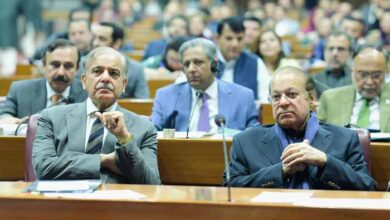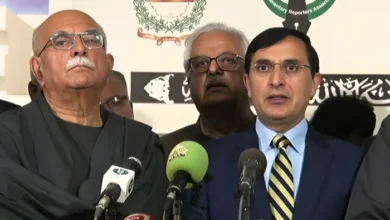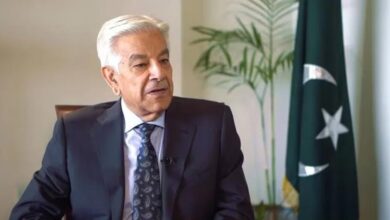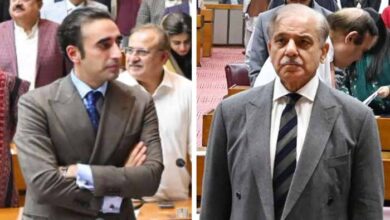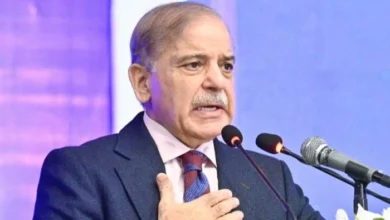ISLAMABAD: The draft of the 27th Constitutional Amendment Bill, which was approved by the Senate on Monday, was presented in the National Assembly for approval on Tuesday, sparking protests from opposition parties.
The assembly session, chaired by Speaker Ayaz Sadiq, began half an hour late. Federal Minister for Law and Justice Azam Nazeer Tarar tabled the 27th Constitutional Amendment Bill for approval.
The proceedings started with a prayer for the late Senator Irfan Siddiqui, after which Minister Tarar began his address, outlining the objectives and implications of the proposed amendment.
Tarar emphasized that constitutional amendments are always carried out after consultation. He explained that the government had opted to establish constitutional benches instead of a separate constitutional court, noting that the establishment of a constitutional court had previously been a key point in the Charter of Democracy.
The minister also addressed judicial appointments and transfers, highlighting that in the past, suo moto powers were sometimes exercised by the prime minister or government officials, occasionally even affecting economic matters.
He said the amendment removes these powers and establishes a structured procedure through the Judicial Commission to oversee appointments and transfers.
Tarar explained that transfers of judges under Article 200 had often been challenged, and that the Judicial Commission would now have the authority to manage such transfers, reducing delays in constitutional court cases.
If the amendment is passed, the current chief justice will head the constitutional commission and related institutions, replacing the prior system in which the prime minister could influence appointments, he added.
The commission, he said, will comprise five Supreme Court and constitutional court judges, along with two members each from the government and opposition, who will decide on transfers.
The minister also clarified the jurisdiction of the courts, stating that the constitutional court will handle provincial and constitutional matters, while the Supreme Court will hear over 62,000 pending civil and other cases.
On military appointments, he noted that the army chief is appointed under the Army Act, and recalled historical instances when the assembly had demonstrated national unity during conflicts with India, which was later recognised by the OIC and Arab countries.
Tarar highlighted the government’s intent to streamline judicial processes and appointments.
A DAY OF MOURNING FOR DEMOCRACY: BARRISTER GOHAR
Pakistan Tehreek-e-Insaf (PTI) leader Barrister Gohar Ali Khan condemned the passage of the 27th Constitutional Amendment, calling it a “day of mourning for democracy”.
He said that the Constitution is a sacred responsibility, “which has been betrayed today,” and warned that those responsible will be held accountable under the law. “Constitutional amendments traditionally raise public hopes, but this one represents a setback for democratic values,” he added.
Barrister Gohar alleged that the amendment is a step toward burying democracy, reducing it to a nominal form. He criticised the revival of the agenda left over from the 26th Amendment. “The structures built on the foundations of power are perceived by the public as a heavy burden,” he continued.
He referred to the manner in which the amendment was passed as the “Baku Amendment,” claiming it was approved from afar without proper public consultation.
‘WHICH PRESIDENT IN THE WORLD HAS IMMUNITY?’
The PTI leader questioned the notion of immunity for political leaders, asking, “Which country’s president has immunity from the law?” He emphasized that accountability before the law is the essence of legal supremacy, and warned against creating an elite class above the law.
Barrister Gohar also criticised provisions of the amendment that, according to him, were designed to protect individuals from their legal cases, describing it as an attempt to control the judiciary and secure favourable decisions.
He said that those in power have resolved their own cases and stepped aside, but asked, “how will we go to the masses?”
He criticised the government for failing to address basic public needs, saying, “People are struggling to get food, hospitals lack beds, yet you aim to create another elite class above the law. You are establishing a constitutional court to serve your own 141 cases, attempting to seize control of the judiciary and secure decisions to suit your interests.”
‘OFFICE OF CHIEF JUSTICE ABOLISHED’
Highlighting changes in the judiciary, he said the amendment abolished the office of the Chief Justice of Pakistan under Article 176, warning that such a move undermines judicial conventions and prevents proper representation of the country in international forums.
Gohar criticised the manner in which the amendment was passed, asserting that changes to the Constitution should be made by consensus in the interest of democracy.
He accused the government of passing the bill with support from only a narrow, self-interested segment of lawmakers. The prime minister had stated that the government has no vote of turncoats (lota).
“Congratulations, yesterday you passed the amendment with the votes of two lotas,” Barrister Gohar concluded.
SENATE APPROVES BILL
Yesterday, the Senate approved the amendment with a two-thirds majority — 64 members voted in favor, and none opposed – as opposition boycotted the proceedings. However, PTI Senator Saifullah Abro and JUI Senator Ahmed Khan voted in favour of the bill.
Among those supporting the amendment were 25 senators from the PPP, 20 from the PML-N, six independents, four from the BAP, and three each from the MQM-P and the ANP.
The PTI, the Sunni Ittehad Council (SIC), the Majlis Wahdat-e-Muslimeen (MWM), and the JUI-F opposed the amendment. Opposition members protested fiercely in the Senate, raising slogans and walked out of the session.
The 59-clause amendment seeks to overhaul the military and judicial structures.
To pass a constitutional amendment in the National Assembly, the support of 224 members is required. The ruling alliance claims to have the backing of 236 lawmakers. The PML-N has 125 seats, the PPP has 74, the Muttahida Qaumi Movement-Pakistan (MQM-P) has 22, the Pakistan Muslim League-Quaid (PML-Q) has five, the Istehkam-e-Pakistan Party (IPP) has four, and the PML-Z, the Balochistan Awami Party, and the National Peoples Party have one seat each.


